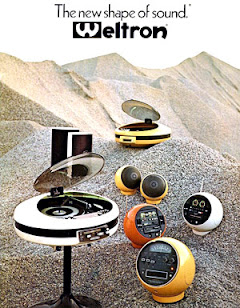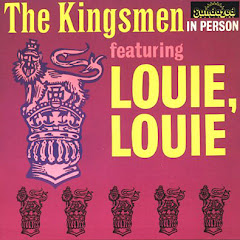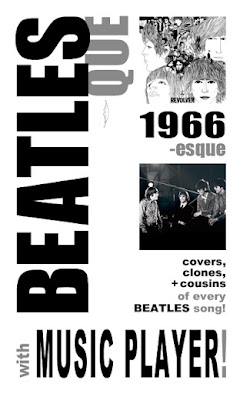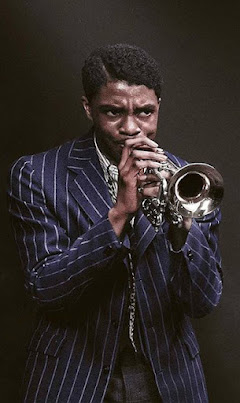now brings you the actual, all-inclusive history of Rock'n'Soul music, with Music Players.
▶ Music Player Checklist
LOUIE LOUIE
This Music Player contains 11 hours of covers, clones, and cousins of "Louie Louie",
from 1957 to today in chronological order, spanning all musical genres.
Sometimes a single song is the refrain. You can group music by genres or eras, but one song can tie all of them together. Or even one riff.
In 1957, Richard Berry created one of those. His ode to Jamaican love was inspired by a few surprising sources: a variant of a Cuban Mambo song called "Cha Cha Chá Loco", and Chuck Berry's "Havana Moon" (which had in turn responded to the brief Calypso boom after "Day-O" broke big). It was a regional hit around San Francisco and made its way into many West Coast 45" collections and jukeboxes. It had a lurching stairstep riff that kids had gone crazy for, one that stuck to your brain and feet.
Up in Seattle, where cold and rain made the emerging early '60s rock'n'roll courser, bands battled each other for supremacy in frats, bars, and proms. Someone latched onto "Louie Louie" and then everybody had to. But The Kingsmen stumbled into the studio first, one day before their rivals Paul Revere And The Raiders. In their haste, they didn't know it well enough. The singer slurred the words to hide it and his false starts after the bridge got left in. The riff lost a beat and became the classic 1-2-3/ 1-2, 1-2-3/ 1-2 that made it The Riff. That arresting combo of jang-ing riff and sloppy attitude built the Garage of the future. It also got them investigated by the FBI on suspicion of slipping obscenities into the unintelligle lyrics.
Great riff + Attitude + Controversy = cultural phenomenon.
In comes imitation and mutation, the catalyst of all culture. There's a moment in music where a riff becomes a general rhythm, and a bedrock for new songs.
It sure stuck in its originator's mind, because Richard Berry did one of the first clones of his own song with 1960's "Have Love Will Travel". His original was a splice, and now that the chords have now become standard chops in any band's repertoire, the re-splicing by his followers begins. East L.A. Mexican rockers The Premiers used the riff under their cover of a different song, "Farmer John". The Trashmen combined both songs openly as "Farmer Louie". The Bobby Fuller 4 medley-ed the two together right into their own clone, "Jenny Lee". Wayne Fontana And The Mindbenders' "The Game Of Love" trysted the Bo Diddley beat into the middle.
Meanwhile, Surf naturally caught the wave, such as "Surfin' Louie" by The Shockwaves and The Surfaris' "Go Go Go For Louie's Place". Fresh from "My Boyfriend's Back", the girl group The Angels went tough chick with it, even preserving the false start in harmony! The Wailers, The Raiders and The Who wrote sequels to it (The Raiders also got 'revenge' on their friends for the lost hit with "Just Like Me"). David Bowie's first recording was a cover of The Raiders' sequel, as Davie Jones And The King Bees (1964). Meanwhile, the Seattle scene was still on fire with the song in every band's repertoire; The Kingsmen's rivals, The Sonics, virtually invent garage rock and punk with a 1965 take so brutal, even the Sex Pistols would wince in admiration.
Now the covers have turned into clones and cousins.
The riff has now become so common that everyone went from a cover into new creations. The Drifers usher in a new standard with "Sweets For My Sweet". The Castaways pull a cover-up with "Liar Liar"; the Soul group The Vibrations scooped a baldfaced substitute as "My Girl Sloopy", and The Real McCoys inserted irony by covering the clone as "Hang On Sloopy".
In Boston patois, The Barbarians' drummer plied his hand with the hook in his autobiographical "Moulty". The Kinks tried to cover it and instead found "You Really Got Me" and "All Day and All Of the Night", two new standards. As garage and pop started colluding on radio hits, The Rare Breed ("Beg, Borrow, and Steal"), The Troggs ("Wild Thing", another new standard), The Rolling Stones ("Get Off of My Cloud", another), The Remains ("Why Do I Cry"), and The Eyes ("I'm Rowed Out") heisted the Jamaican ship for new ports.
Culture is typically cyclical based on response, and a song that was first inspired by Mambo cha-cha-cha rhythms was in turn covered extensively in Spanish-speaking countries (including its clones) by acts like Los Loud Jets, Sonia, and The Sandpipers.
Toots And The Maytals.
From covers, to clones, to cousins, and finally to culture. At this point it became a free-for-all. An idea has become universal, and every response transforms it with new perspectives. It's everybody's party, and everybody has a part in it.
Quincy Jones did a jazz cover of a clone with "Hang On Sloopy". Conga god Mongo Santamaria sailed back to Cuba in his take on "Louie Louie". Torch damsel Julie London gave it a sultry shoreleave it will never forget. Ike & Tina Turner gave it an soulful shakedown at the Apollo while Otis Redding cruised it through Memphis.
It lazes under the bridge of "You've Lost That Loving Feeling" by The Righteous Brothers. A twist on it rolls through Bob Dylan's "Like a Rolling Stone". It twined through Frank Zappa's work continously, including firing a guitarist when they couldn't play it. Quietly, the sing-song riff sways under The Rascals' "Good Lovin'", Erma Franklin's "Piece Of My Heart", and Tommy Roe's "Dizzy".
It was wham-bammed by Glam bands in the early '70s, of course. The funk-pop band Hot Chocolate familiarized it into their hit "Brother Louie". Toots & the Maytals brought it home to Jamaica in reggae stylee. It grooves under "Summer Days, Summer Nights" from the movie musical GREASE. Barry White got up close and personal with it. Stanley Clarke and George Duke funked around with it.
But the song never forgot its edge. The song had become less a riff and more of a shorthand writ of young swagger and rebel sneer. In the '70s and '80s it often took on a seedy and dangerous allure, continuing to kick against the pricks.
Garage rock had spat out the crazed stepchild, The Stooges. On a bootleg of their last gig in '74, Iggy Pop uses "Louie" as a frame to taunt his audience out of boozy complacency. One patron purportedly beans him with a beer bottle, which is the thump and buzzing mike heard at the end. Lou Reed's "Vicious" helped inspire Sid's name. The Clash lashed it and The Fall sneered it in concert in '77. Johnny Thunders stumbled through it on his way to the glass table.
"Louie Louie" was now being unfurled like a Jolly Roger. L.A. punks X flash glimmers of its sway within "We're Desperate". Some of its ghost can be traced in the swaying buzz of The Dickies' "You Drive Me Ape (You Big Gorilla)". It was Motorhead's first single. Black Flag refuses surrender with it in 1981. "Love Sinks", by The J. Geils Band, is a revamp of it via "Wild Thing". Acts as diverse as D.R.I., Joan Jett, The Pretenders, The Fat Boys, The Ultra Magnetic MCs, Sisters of Mercy, and more shanghaied its course through the '80s. For Russian emigres Red Square it was a very real rejection of repression and a charter to deliverance.
Then it came full circle. From the hinterlands near Seattle, Kurt Cobain corrupted the chords into a splice with Boston's "More Than a Feeling" in 1991. "Smells Like Teen Spirit" is a perfect summation of everything that made "Louie Louie" great in the first place: a kicking riff, a sloppy attitude, mysterious lyrics, and a combustible audience. Again, it had become the rallying cry for fun and foment, which is Rock'n'Roll incarnate. Perfect.
From culture into community. Ultimately, a riff becomes a communal experience, a rallying cry, a Morse-code beacon, a universal bond like the heartbeat; this is Us, this is home.
In 1993 Iggy Pop revolted from style back into sting, using the song to navigate modern protests and soul-searching. He said the song always steadies him when he goes off course. Likewise, the insanely prolific punk Billy Childish keelhauled it for a sequel with his garage band Thee Headcoats in '95: "Louie Louie (Where Did She Roam)" sets course for new shores in pursuit of that elusive island love. Which, beyond the riff and its attitude, may be the secret refrain of the song that haunts the memory; ache at the landlocked present and longing for an open future.
Great idea + varied response + shared experience = culture.
Culture is formed and maintained by the interchange of community; like the ocean, every current, crosscurrent, ebb, flow, swell, and wave remolds it while holding it together. "Louie Louie" is an undercurrent of raw Rock'n'Roll spirit driving the tides across time. It is ever-current, from Jane's Addiction, The A-Bones, and Blur, to The Black Keys, Boonaraas, Foxygen, and The Love Me Nots. Set course. Said we gotta go now.
A-A-A, D-D, Em-Em-Em, D-D...
© Tym Stevens
See also:
-The Pedigree of PETER GUNN
-Shock Waves: How SURF MUSIC Saved Rock'n'Roll!







































































































































No comments:
Post a Comment